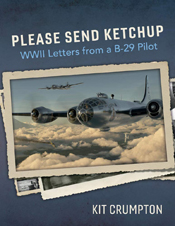History lover and former engineer Kit Crumpton writes historical fiction and nonfiction inspired by her family’s past. Her fourth and most recent release is Please Send Ketchup: WWII Letters from a B-29 Pilot (2019). Connect with Kit on her website KitCrumpton.com, and discover more about her writing in SWW’s 2016 and 2017 interviews.
 What is your elevator pitch for Please Send Ketchup?
What is your elevator pitch for Please Send Ketchup?
How does one preserve their heart, mind and soul in a brutal theater of fire during war? My father knew the answer: faith in God, community involvement, planning a future, love of country, duty and staying close to family.
What do you hope readers will take away from the book?
My father’s letters and reader awareness of WWII events bring challenges of a life experience to the surface. My dad found a way to negotiate through this darkness and find moments of light. If their heart is open, my reader can ponder these things in their own life path.
How did you choose the title?
Many of my dad’s letters end with requests for condiments, family pictures, local newspapers, canned foods and some necessities that gave my dad the feel of home, loved ones, and brought him some momentary relief from the pressures of war.
What unique challenges did this work pose for you?
There are four voices in this book, so I had to figure out how to manage each one. My dad’s letters (his voice) are in italics. Sadly, I preferred a script font but was advised the younger generation do not know how to read script (too bad). Two other voices include high-level descriptions of B-29 Superfortress bombing missions and low-level personal mission accounts. My BookBaby (producer) interior designer did a great job in delineating these things. Each page has footnotes and some of those footnotes are my comments—another voice. I insisted all footnotes be at the bottom of each page (another book interior designer challenge). My comments are in red font so the reader’s eye will naturally notice my words on the page.
This book is done in color, has pictures, over three-hundred sixty footnotes, a glossary and a robust bibliography. My editor did a great job validating my bibliography. She also found some better sources.
What prompted the push to begin this project?
Fortunately, my dad was a pack-rat and kept evidence of his robust military career. I inherited all his papers. I simply reached a point in my life where I could write and produce my books. I am very interested in WWII. Dad’s career turned my head toward the Pacific Theater. This book took about eighteen months to write and produce.
What was your favorite part of putting the book together?
There are powerful moments that still bring me tears. My dad barely survived two of his missions, yet he bravely performed as a warrior and a leader of his crew. I noticed how he attended church after some of his missions. He wrote about some of the sermons he heard. The last one has powerful words the chaplain gave to his flock. I sometimes still cry when I read his description of what happened when the war was finally over. The news was received with dizzying reactions, tremendous relief, wondering if it was true, and survivor’s guilt. I found a photo of my dad and members of his fight crew and ground crew underneath his B-29 named Dark Eyes reveling with the news of the war’s end.
Was there anything surprising you discovered while doing research for Please Send Ketchup?
Yes, I did not know: 1) We conducted more Superfortress bombing missions after we dropped the second atomic bomb. President Truman became concerned the Japanese were taking too long to announce their surrender. So, we bombed six more targets and dropped more mines into their waters at Shimonoseki. My dad flew his B-29 Dark Eyes over Hikari Naval Arsenal, August 14, 1945. After that, the Japanese surrendered. 2) That at the end of the Japanese surrender ceremony on USS Missouri, September 2, 1945, we flew almost anything that was flyable down low over the battleship and into Japanese airspace. The message was clear, that Japan would never be the same again. 3) There were several other smaller Japanese surrender ceremonies after the famous one on USS Missouri. These surrender ceremonies speak to the vast Japanese empire of that era: Southwest Asia, New Guinea, Korea, Australia, Timor, Borneo, Vietnam, Hong Kong, and China. 4) Russia took advantage of Japan’s dilemma, declared war on Japan on August 9, 1945 and invaded Manchuria. How conniving!
Looking back to the beginning of your writing/publishing career, what do you know now that you wish you’d known then?
My background is in engineering, so I know how to conduct research and write papers. Having my own writing and self-publishing business, I knew I would make mistakes. Fortunately, I’ve only made a couple and I’ve survived. But nothing prepared me for a personal, verbal attack I received from a veteran. Not liking a book is one thing but triggering an attack on an author was something I did not expect. You never know how you touch another person’s life. That one I give to God.
What is the best encouragement or advice you’ve received in your writing journey?
Take the risk. Life is a journey, so live life fully. Good people will recognize what you are trying to do and encourage you. Blessings are around the corner.
 KL Wagoner (writing as Cate Macabe) is the author of This New Mountain: a memoir of AJ Jackson, private investigator, repossessor, and grandmother. Kathy posts to a speculative fiction blog at klwagoner.com and writes about memoir at ThisNewMountain.com.
KL Wagoner (writing as Cate Macabe) is the author of This New Mountain: a memoir of AJ Jackson, private investigator, repossessor, and grandmother. Kathy posts to a speculative fiction blog at klwagoner.com and writes about memoir at ThisNewMountain.com.


























Leave a Reply